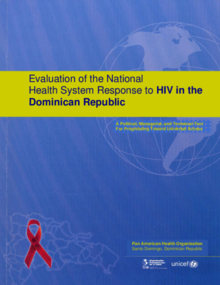Evaluation of the National Health System Response to HIV in the Dominican Republic; 2008

|
A Political, Managerial, and Technical Tool for Progressing Towards Universal Access
Scope and Purpose In response to a request from the Secretary of Health of the Dominican Republic, the Pan American Health Organization (PAHO/WHO) assumed the responsibility of coordinating an external evaluation of the National Health System’s response to the HIV epidemic in the country. The evaluation team consisted of national and international personnel representing a number of different cooperation agencies (PAHO/WHO at the regional and global level, UNICEF, UNAIDS, and USAID). The national process was carried out under the political and strategic leadership of the Secretary of Public Health and Social Welfare and the PAHO/WHO Representative in the country, while responsibility for technical management was shared by the Directorate General of STI and AIDS Control (DIGECITSS) and a multidisciplinary technical team assembled by PAHO/WHO and UNICEF. The process, which was highly participatory, had the support of the United Nations Theme Group on HIV/AIDS and its Secretariat (UNAIDS), other international agencies, including USAID, several programs and units of the Ministry of Public Health and Social Welfare (SESPAS), the Presidential Council on AIDS (COPRESIDA), nongovernmental organizations, and networks of persons living with HIV. The evaluation team worked intensively on gathering the information, a process that involved reviewing statistics and documents and holding a series of meetings with key players (users, suppliers, policy-makers, and technical and financial decision-makers). The period under evaluation starts in 2003, the year when the country introduced a more integrated national response and took on the execution of external resources. The present document reports the findings from this exercise, which was conducted in three phases: (a) collection of data and presentation of the findings and preliminary recommendations (4-5 December 2006), (b) participation in a workshop to discuss the findings and recommendations emanating from the evaluation (9-10 March 2007), and (c) participation in a workshop to prepare a plan of action based on the findings from the evaluation (12-13 April 2007). |
